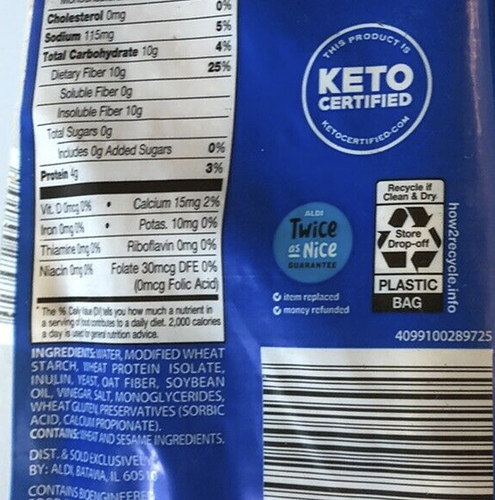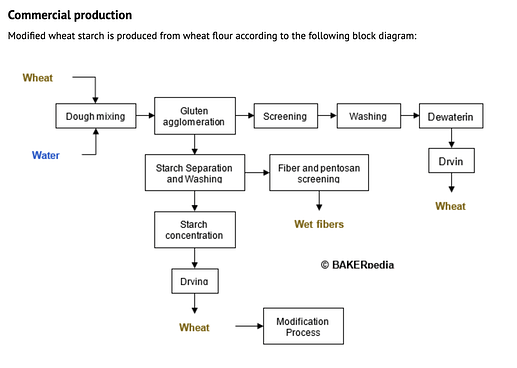But my metabolic concern remains the same: You cannot avoid the insulin spike from eating a bowl full of sugar by also eating a bowl full of wood pulp at the same time.
But there isn’t a bowl full of sugar or even 100g of sugar in the Aldi bread. Not even close.
But I like that you got me to look more closely at the ingredients!
As far as I can tell, the Aldi bread has “modified” the wheat starch to a pure fiber form. According to Bob’s Red Mill site modified starches are “…physically, enzymatically, or chemically altering starch to change its inherent properties. In this instance, modified does not necessarily mean genetically modified.” There is no clear research if any of the wheat starch afterwards is still digested or not. Some think some still is, but it is all theoretical and conjecture. If any is digested it would be a very small amount per slice and wouldn’t be more than a 1g carb impact per slice at most, probably less, which is still great for such soft, full sized bread. Other than the ridiculous and stupid choice of the soybean oil, it is the only other ingredient that might make someone question its keto-friendly status, because of the potential minor impact to carbs.
The wheat gluten doesn’t directly cause a metabolic response because it’s essentially low in carbs. It’s only a problem for those with gluten sensitivities and I don’t have that.
The wheat protein isolate is in the same boat. Only a concern for celiac disease or someone with gluten sensitivities.
Oat fiber is one of the few ingredients in this bread that is actually fully keto. It’s an insoluble fiber created from the hull of oats and not digested, so it has no impact on blood glucose levels.
Chickory root contains a prebiotic dietary fiber called inulin. I don’t know enough about it so I Googled it and the first result said “Inulin is a type of dietary fiber. Research has linked it to several health benefits, such as improving digestive health, helping control diabetes, and aiding weight loss. Inulin is a dietary fiber that may benefit gut health”
Wheat bran is very high in fiber. It contains 20g of carbs and 14g of fiber per ½ cup. That’s 6g net and I doubt there is 1/2-C in the whole loaf, much less a single slice. But again, it’s not gluten-free, and again not a concern for my body.
Compared to all the other low-carb/no-carb wannabe breads out there, this was the only one to be full size (Sola is literally American Girl Doll sized,) stays soft like traditional bread, and holds up to liquid, and … not taste like pure cr*p, and it had the best ingredients I’ve seen so far, albeit far from perfect because some bozo who doesn’t fully understand keto or know we also care about the quality of foods we eat chose to use soybean oil rather than avocado or coconut oil or something else that’s healthier. No doubt a money saving issue. Thank God I don’t eat that much of it throughout a week. I’m more concerned about the oil used than I am the fiber used!
I’m willing to hear if any of these ingredients are bad for us in other ways. And I’m willing to hear if there is potentially more than 2g carb per slice. Keto is not a no-carb diet, it’s a very low carb diet, but I’ve always understood that we can choose how to spend those 20 carbs and most of them should be healthy carbs and not empty/cr*p carbs like corn syrup or maltodextrin etc.
I thought I had found a fairly clean Keto bread if eaten occasionally and not every single day, out of a lot of bad choices out there. (I know we can make our own but my skills with keto baking ingredients are not yet up to par to be able to do that - yet.) But any additional insight about it or counterpoints to my points would be awesome. Like I said, I want to know my choices have me on a good path.






 I dont eat those every day but maybe I’ll have something every other day. I haven’t had the urge to eat anything not in the keto diet window yet. I’m sure one day is coming where I’ll get a raging hunger pain while away from home and be at the mercy of offerings that aren’t keto friendly. But I don’t leave my house much other than physical therapy, so it may not happen for a while.
I dont eat those every day but maybe I’ll have something every other day. I haven’t had the urge to eat anything not in the keto diet window yet. I’m sure one day is coming where I’ll get a raging hunger pain while away from home and be at the mercy of offerings that aren’t keto friendly. But I don’t leave my house much other than physical therapy, so it may not happen for a while.